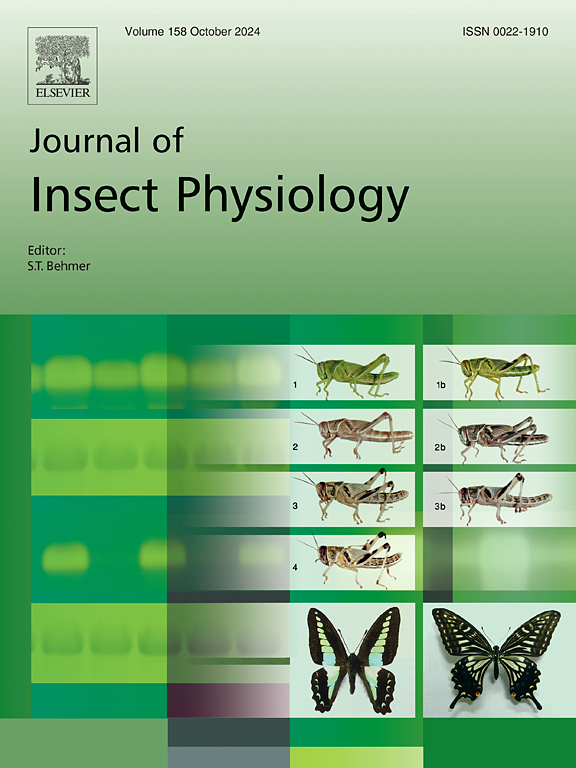A potential role for the interaction of Wolbachia surface proteins with the Drosophila microtubulin in maintenance of endosymbiosis and affecting spermiogenesis
IF 2.3
2区 农林科学
Q1 ENTOMOLOGY
引用次数: 0
Abstract
Wolbachia, as a widely infected intracellular symbiotic bacterium in Arthropoda, is able to manipulate the reproduction of insect hosts for facilitating their own transmission. Cytoplasmic incompatibility (CI) is the most common phenotype that Wolbachia induced in insect hosts where they resulted in the failure of uninfected egg hatch when fertilized with the sperm derived from Wolbachia-infected males, suggesting that the sperm are modified by Wolbachia during spermatogenesis. Although the molecular mechanisms of CI are beginning to be understood, the effects of Wolbachia on the symbiotic relationship and the proper dynamics of spermatogenesis have not yet been fully investigated. We report here that Wolbachia infection induced a significant upregulation of betaTub85D in the testis of Drosophila melanogaster. Knockdown of betaTub85D in fly testes resulted in significant decrease in the copy number of Wolbachia surface protein gene (wsp), indicating a notable reduction of Wolbachia density. Pull-down analyses revealed that WSP interacted with the betaTub85D of D. melanogaster. Wolbachia infection altered the interactome between betaTub85D and other proteins in the testes, and may thus change the protein synthesis and metabolic pathways. Wolbachia infection induced not only an interaction of betaTub85D with Mst77F but also increase in phosphorylated Mst77F. These results suggest that Wolbachia WSP protein might play important roles in anchoring the endosymbiont to the host’s cytoskeleton and consequently interfere the interactions among key proteins involved in spermatogenesis in the insect host testes, resulting in modified sperm.

沃尔巴克氏体表面蛋白与果蝇微管蛋白相互作用在维持内共生和影响精子发生中的潜在作用。
沃尔巴克氏体是节肢动物中广泛感染的细胞内共生细菌,能够操纵昆虫宿主的繁殖以促进其自身的传播。细胞质不相容(Cytoplasmic incompatibility, CI)是沃尔巴克氏体在昆虫宿主中诱导的最常见的表型,当与沃尔巴克氏体感染的雄性精子受精时,它们导致未感染的卵子孵化失败,这表明精子在精子发生过程中被沃尔巴克氏体修饰。虽然CI的分子机制开始被理解,但沃尔巴克氏体对共生关系和精子发生的适当动力学的影响尚未得到充分的研究。我们在这里报道沃尔巴克氏体感染诱导黑腹果蝇睾丸中β ub85d的显著上调。敲低betaTub85D后,蝇睾丸沃尔巴克氏体表面蛋白基因(Wolbachia surface protein gene, wsp)表达显著降低,沃尔巴克氏体密度显著降低。下拉分析显示WSP与黑腹龙的betaTub85D相互作用。沃尔巴克氏体感染改变了睾丸中betaTub85D与其他蛋白质之间的相互作用,从而可能改变蛋白质的合成和代谢途径。沃尔巴克氏体感染不仅诱导betaTub85D与Mst77F相互作用,而且磷酸化的Mst77F也增加。这些结果表明,沃尔巴克氏体WSP蛋白可能在将内共生体锚定在宿主细胞骨架上,从而干扰昆虫睾丸中参与精子发生的关键蛋白之间的相互作用,从而导致精子被修饰。
本文章由计算机程序翻译,如有差异,请以英文原文为准。
求助全文
约1分钟内获得全文
求助全文
来源期刊

Journal of insect physiology
生物-昆虫学
CiteScore
4.50
自引率
4.50%
发文量
77
审稿时长
57 days
期刊介绍:
All aspects of insect physiology are published in this journal which will also accept papers on the physiology of other arthropods, if the referees consider the work to be of general interest. The coverage includes endocrinology (in relation to moulting, reproduction and metabolism), pheromones, neurobiology (cellular, integrative and developmental), physiological pharmacology, nutrition (food selection, digestion and absorption), homeostasis, excretion, reproduction and behaviour. Papers covering functional genomics and molecular approaches to physiological problems will also be included. Communications on structure and applied entomology can be published if the subject matter has an explicit bearing on the physiology of arthropods. Review articles and novel method papers are also welcomed.
 求助内容:
求助内容: 应助结果提醒方式:
应助结果提醒方式:


